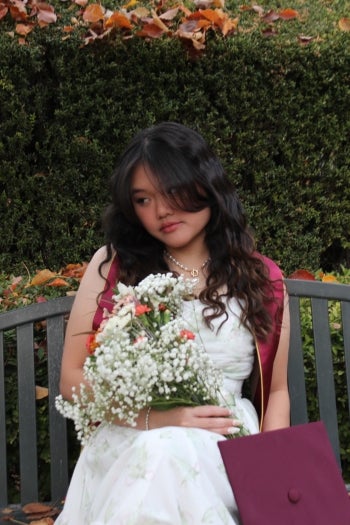Editor’s note: This story is part of a series of profiles of notable fall 2024 graduates.
During high school, Nguyen Thien Ha Do, a graduating student in the medical studies program at the College of Health Solutions, discovered her love for chemistry. She enjoyed the process of learning how compounds are combined and the critical thinking skills to conduct experiments to solve problems.
“While I appreciate and enjoy problem-solving and analytical aspects of chemistry, I want to apply that knowledge in a way that improves people’s health and lives. I want a career that combines science with direct human impact,” Ha Do said.
This passion for problem-solving and making a difference in the lives of others is what drives Ha Do to explore the medical studies program. Ha Do’s determination paid off by earning her top marks in her coursework and top recognition in the form of becoming a Moeur awardee.
“Being a recipient of the award feels like a great celebration of the hard work I put in during my time as a student here,” Ha Do said. “It reminds me of how far I've come and motivates me to keep pushing myself in the future.”
After graduation, Ha Do looks forward to starting her position as a medical assistant in a radiology surgery clinic. In this new role, she will assist with patient care and performing clinical tasks
Question: What was your “aha” moment when you realized you wanted to study the field you majored in?
Answer: I was enrolled in a dual enrollment program in high school, and I took a chemistry class to fulfill my science prerequisite. I really enjoyed it and was really interested in the class, and after doing a research project, it solidified my interest in science.
Q: Why did you choose ASU?
A: I chose ASU because the university offers a well-structured program that emphasizes the development of essential skills for health care professionals. Moreover, there are many knowledgeable professors who bring practical, real-world experience to their teaching. The curriculum is tailored to accommodate various health care pathways, providing valuable opportunities for hands-on experience and building professional connections, which are critical for success in the field.
Q: What’s something you learned while at ASU — in the classroom or otherwise — that surprised you or changed your perspective?
A: After taking my classes, I came to realize how interdisciplinary knowledge can be. Lessons from different fields can connect to each other in different ways, providing multiple perspectives to one concept or skill. This showed me the value of thinking beyond one single discipline to solve problems.
Q: Which professor taught you the most important lesson while at ASU?
A: Each professor at ASU, with their incredible expertise and diverse perspectives, taught me valuable and unique lessons. From critical thinking, problem-solving, to interpersonal skills and collaboration. They all contributed to helping me become a more well-rounded person.
Q: What was your favorite spot on campus, whether for studying, meeting friends or just thinking about life?
A: The courtyard at the University Center Building on the West Valley campus! It has a peaceful atmosphere, making it a great place to relax, reflect or catch up on work.
Q: What’s the best piece of advice you’d give to those still in school?
A: One advice I would give is to stay curious and take advantage of all opportunities to learn and discover something new, both inside and outside of the classroom. I would also advise them to do anything that they’re interested in trying, as it’s better to try and fail than to not try at all.
Q: What are your plans after graduation?
A: I plan on getting PCE (patient care experience) working as a MA (medical assistant), and then applying to graduate school to further my education.
Q: If someone gave you $40 million to solve one problem on our planet, what would you tackle?
A: If I were given $40 million, I would focus on ensuring everyone has a safe and healthy living environment and addressing world hunger. I believe that everyone deserves to feel safe and secure when it comes to basic human rights and necessities. Addressing these issues would not only save lives but also empower communities by improving physical, mental, and emotional health, allowing everyone to build a better future for themselves and the community.
More Health and medicine

The science of sibling dynamics: Why we fight, how we relate and why it matters
We have Mother’s Day, Father’s Day and even Grandparents’ Day. But siblings? Usually they get a hand-me-down sweatshirt and, with any luck, a lifetime of inside jokes.But actually, there is a…

New study seeks to combat national kidney shortage, improve availability for organ transplants
Chronic kidney disease affects one in seven adults in the United States. For two in 1,000 Americans, this disease will advance to kidney failure.End-stage renal failure has two primary…

New initiative aims to make nursing degrees more accessible
Isabella Koklys is graduating in December, so she won’t be one of the students using the Edson College of Nursing and Health Innovation's mobile simulation unit that was launched Wednesday at Arizona…


